Testing The Temperature 4
What do voters in Northern Ireland think about the Protocol on Ireland/Northern Ireland?
David Phinnemore, Katy Hayward and Lisa Whitten
February 2022
The full report is available to download here: Testing the Temperature 4
Key Findings
- Opinion among voters in Northern Ireland on the Protocol continues to be deeply divided, with only a small portion of respondents having ‘no opinion’ on the topic
- Half (50%) currently see the Protocol as the appropriate means for managing the impact of Brexit on Northern Ireland and as overall ‘a good thing for Northern Ireland’; 40% respondents are of the opposite view.
- Over two-thirds of respondents (69%) believe that particular arrangements for Northern Ireland are necessary to manage the impact of Brexit.
- 6 in 10 respondents do not think that Brexit is overall ‘a good thing’ for the UK.
- The majority polled have concerns with respect to the Protocol and its impact (indirect if not direct)
- The predominant concern about the Protocol remains its impact on political stability in Northern Ireland.
- The latest poll confirms several shifts in opinion noted in the October 2021 poll compared to those in March and June last year.
- This is broadly towards a more positive view of the Protocol, particularly with respect to its economic impact and the potential economic opportunities it offers.
- Levels of concern about the Protocol-related issues identified by the UK government vary quite widely
- The impact of the Protocol for the supply of medicines to Northern Ireland and for customs paperwork remain priority concerns for respondents.
- Removing the jurisdiction of the Court of Justice from the Protocol is not among the top priority concerns for voters in Northern Ireland.
- There are high levels of distrust in political actors and institutions when it comes to managing Northern Ireland’s interest with respect to the Protocol
- The UK government is by far the most distrusted (84% distrust, 51% strongly so) and least trusted (4% trust) of all actors
- Voters in Northern Ireland are evenly split (45% each) on whether they trust or distrust the European Commission/EU. These results are similar to those for the Irish government regarding the Protocol (46% distrust, 42% trust).
- No political party in the NI Executive is trusted by more than 45% of respondents. The SDLP and Alliance are most trusted, followed by Sinn Féin, and the UUP. Almost three quarters of respondents (72%) continue to distrust the DUP on the Protocol.
- NI business representatives continue to be the only actors who enjoy the trust of a majority (59%) in managing NI interests with respect to the Protocol. This figure has grown steadily over the four polls.
- The Protocol is not the issue that currently causes most concern to most voters
- Presented with ten issues, more respondents indicated the future of the NHS, the constitutional future of Northern Ireland (although this was also of lowest concern to 1 in 5 respondents), or the economy to be of greater concern to them.
- One third (32%) ranked the Protocol among the three issues of most concern to them.
- More respondents (44%) ranked the Protocol among the three issues of least concern to them.
- There are clear patterns with respect to the majority view of voters in Northern Ireland when it comes to what should happen next with the Protocol
- A majority (53%) of respondents, as in October 2021, disagrees that the UK would be justified in triggering Article 16 now.
- A clear majority (78%) supports formalised structures for UK-EU consultation on the Protocol with civil society and business representatives.
- A clear majority (6 out of 10) disagree with the Protocol-related intentions of Minister Poots’ order to stop checks and Paul Givan’s resignation as First Minister.
- There is a very evident problem when it comes to information, knowledge and understanding of the Protocol
- A substantial majority of respondents continue to claim ‘a good understanding’ of the Protocol, although their factual knowledge of the Protocol does not necessarily support such claims.
- Most do not believe they can rely on the print and broadcast media in Northern Ireland to provide balanced coverage of developments concerning the Protocol.
- Respondents remain split on how their MLAs should vote in the 2024 ‘democratic consent’ vote
- Half (50%) favour MLAs voting for the continued application of the Protocol; 42% want MLAs to vote against.
- Regarding the upcoming Assembly election, 43% say they will only vote for MLAs who support the full application of the Protocol; 37% will only vote for those against it. Only 1 in 5 won’t consider a candidate’s position on the Protocol when they cast their vote.
Introduction
As part of a three-year ESRC-funded research project on the Protocol on Ireland/ Northern Ireland, a series of regular surveys has been commissioned to ‘temperature test’ voter attitudes on a range of issues relating to Brexit, the Protocol, and their implications for Northern Ireland. This is the only polling in Northern Ireland dedicated to the topic of the Protocol and which has been running at regular intervals since the Protocol entered into force on 1 January 2020 following the end of the transition period.
The surveys are being conducted every 3-4 months during 2021-2023 by LucidTalk using its online Northern Ireland Opinion Panel. This means that the survey is not based on systematic random sampling across Northern Ireland (NI) society. Instead, it is a reliable indicator of the opinion of Northern Ireland voters who take an interest in current affairs and politics, and who are likely to exercise their right to vote. LucidTalk have a strong track record of accurately predicting election and referendum results in Northern Ireland on the basis of polling this Opinion Panel. The results presented here are from a sample of 1516 responses to the survey undertaken on 4-7 February 2022. The sample of responses used is weighted to be representative of the adult population of Northern Ireland (e.g. by age, gender, party support). All results presented are accurate to a margin of error of +/-2.3% at 95% confidence.
The context for this poll
This fourth survey was held just over a year into the post-transition period of Brexit and four months after the third survey in October 2021. The previous surveys took place in March and June 2021. This survey occurred at a time when grace periods for the implementation of core provisions of the Protocol, particularly regarding formalities, checks and controls on the movement of goods into Northern Ireland from the rest of the United Kingdom (UK), remained in place by mutual agreement. Against this background, the UK and the European Union (EU) have been in ‘technical talks’ in an effort to find a path towards agreeing revised arrangements for the Protocol’s full implementation. A key driver for this was the UK government Command Paper Northern Ireland Protocol: the way forward published in July 2021.
Shortly after our October poll, the European Commission published four ‘non-papers’ (13 October 2021) concerning the implementation of the Protocol with proposals for addressing “the difficulties that people in Northern Ireland have been experiencing because of Brexit”. The non-papers focused on arrangements to reduce customs checks and simplify processes and procedures for the movement of agri-food products into Northern Ireland, maintain the supply of medicines into Northern Ireland, and increase stakeholder engagement on the implementation of the Protocol.
Regular meetings between the UK and EU co-chairs of the Joint Committee, Lord Frost and Maroš Šefčovič, were soon being held to try and resolve issues. Progress was made on the medicines issue with the EU in December publishing proposals to amend EU legislation, but on the customs and SPS issues progress was limited. This helped fuel mounting speculation that the UK government would deliver on its persistent threat to take unilateral action to suspend parts of the Protocol by triggering Article 16, a move that would have had the support of many unionists opposed to the Protocol.
Article 16 was not triggered then, in part due, arguably at least, to the EU’s apparent willingness to contemplate extensive countermeasures, including potentially suspension of the UK-EU Trade and Cooperation Agreement. Then, on 18 December 2021, Lord Frost resigned from the UK government, with the Foreign Secretary, Liz Truss, taking over responsibility for the implementation of the Protocol and resolving outstanding issues with the EU. The immediate effect was a more convivial tone in the discussions with Šefčovič, although there were few signs of progress in talks between the UK and the EU. However, although Truss was clear that there was "a deal to be done", she also confirmed here readiness, if necessary, to trigger Article 16. Following their initial meetings, Šefčovič and Truss were nevertheless able to agree ‘joint’ statements.
In Northern Ireland, the Protocol remained a focus of political contestation during the months prior to this February poll. Most vocal has been unionist opposition to the ‘Irish Sea Border’. This was central to the legal challenge to the lawfulness of the Protocol heard by the Court of Appeal in Belfast in November 2021. It also contributed to Edwin Poots, Minister for Agriculture, Environment and Rural Affairs, ordering port officials on 2 February 2022 to cease certain checks and controls on the movement of agri-food goods into Northern Ireland from Great Britain, as required by the Protocol. At the time of the poll – 4-7 February 2022 – those checks and controls were still being implemented pending the outcome of a High Court review of the Minister’s order. Adding to the political drama and providing the immediate backdrop to the poll was the resignation on 3 February 2022 of Paul Givan as First Minister in the Northern Ireland Executive.
Poll survey participants were asked six sets of questions and offered the opportunity to provide written comments in response to the poll. The questions covered attitudes towards Brexit and the Protocol, assessments of the impact of the Protocol, issues of concern, trust in different actors to manage it, and knowledge of the Protocol. The survey also asked participants how they would like members of the Northern Ireland Assembly (MLAs) to vote in the ‘democratic consent’ vote on Articles 5-10 of the Protocol that will be held at the end of 2024. A final section included questions on various issues, including options for the governance of the Protocol, whether the UK would be justified in triggering Article 16 and the significance of recent political developments for the Protocol.
Attitudes to Brexit and the Protocol
Opinion on Brexit and the Protocol continues to be divided and generally consistent with the previous ‘testing the temperature’ polls held in 2021. Shifts in opinion identified in October 2021 have been confirmed by this latest poll.
Three quarters of respondents claim a ‘good understanding’ of the Protocol (see Figure 1). The proportion of respondents who think that reliable information on the Protocol is available has increased from 43% in October 2021 to 47%; this is higher than in previous polls (37% in March; 40% in June). We return below to the matter of public comprehension of the Protocol in a further set of questions in the poll.
In line with previous polls, over two thirds of respondents agree that ‘particular arrangements’ for Northern Ireland are needed to manage the effects of Brexit, with 44% of all respondents being strongly of this view. There continues to be a clear majority (59%) who disagree that Brexit is on balance ‘a good thing for the UK’, with an absolute majority (51%) being strongly of that opinion; 36% of respondents agree or strongly agree that Brexit is on balance good for the UK.
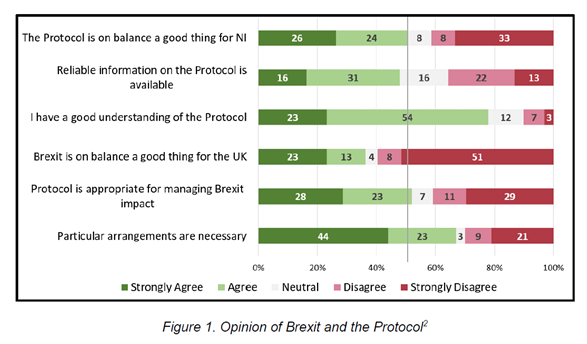
The proportion of respondents who agree or strongly agree that the Protocol provides an appropriate means for managing the effects of Brexit for Northern Ireland stands at just above half (51%), as in the October 2021 poll (53%), which was higher than the 46% of this view in June 2021. As in the October poll, 1 in 2 respondents regard the Protocol as ‘on balance, a good thing’ for Northern Ireland (compared to 43% of this view in June 2021).
This shift in opinion between the initial and the more recent polls towards majority acceptance of the Protocol is also reflected in responses to the question on whether the Protocol provides Northern Ireland with a ‘unique set of post-Brexit economic opportunities compared to the rest of the UK which if exploited could benefit Northern Ireland’. As in October, more than three fifths of respondents (63%) agree that there are economic opportunities from the Protocol – an increase on the June (57%) and March (50%) polls in 2021. Also as in October, only a quarter of respondents disagree.
Views on the impact of the Protocol
A substantial majority of respondents continue to view the Protocol as having a negative impact across a range of matters (see Figure 2). However, as in the previous polls, opinions have shifted on some topics. In the first poll, no more than a third of respondents saw the current impact of the Protocol to be positive in relation to selected topics. In June 2021, the figures had increased to, or towards, 40% support in terms of the Protocol’s impact on the economy of Northern Ireland, protecting the 1998 Agreement, and north-south cooperation on the island of Ireland.
In the October poll, more than two fifths of respondents viewed the Protocol as having a positive effect in these areas, with positive views exceeding negative views. However, whereas in October 2021 a slender majority (51%) of respondents viewed the Protocol as having a positive effect on the economy of Northern Ireland, the figure had dropped to 48% in February 2022. This is still a much higher proportion of respondents compared to the first poll in March 2021 when only (33%) viewed the effects as positive. It should be noted, for context, that many of the Protocol’s provisions regarding formalities, checks and controls on the movement of goods into Northern Ireland from Great Britain are either not being implemented or only being implemented partially.
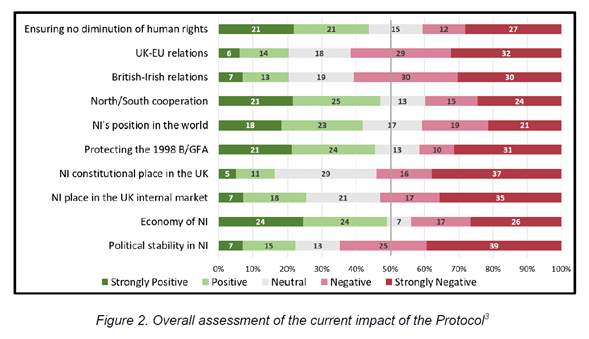
For most topics, a majority of respondents continue to see negative impacts; in some cases, the majority remains considerable. Nearly two-third of respondents (64%) see the Protocol impacting negatively on political stability in Northern Ireland. While the proportion is higher than in October 2021 (59%), it remains lower than in June (68%). The same level of concern for the effects of the Protocol is also reflected in answers at a later point in the survey, in which 64% respondents agree that ‘a failure by the UK and the EU to agree soon a solution to the outstanding issues regarding the Protocol would undermine peace and stability in Northern Ireland’.
The Protocol’s impact on British-Irish relations and UK-EU relations continues to be regarded by around three-fifths of respondents (60% and 61% respectively) as negative, although, as in the October poll, there continues to be more positive perspectives on this than in the June 2021 poll (67% and 70% respectively).
The shift seen in the October 2021 poll to a less negative view of the impact of the Protocol on Northern Ireland’s constitutional position in the UK and its place in the UK internal market is confirmed in the February 2022 poll. The proportion of respondents seeing the Protocol’s impact as negative in these ways (53% and 52%) is less than June 2021 (62% and 60%), but it is still a majority view. On the impact of the Protocol on ensuring ‘no diminution’ of individual rights as set out in the 1998 Agreement, the shift noted in October 2021 to being marginally positive (45% positive against 40% negative) is also reflected in the February 2022 poll (42% positive against 39% negative) although the gap has narrowed slightly.
Written comments expressing positive and negative views
Views expressed in the written comments reveal the largest number of responses articulating positive perspectives on the Protocol, with 29% describing it as beneficial, potentially beneficial or as a necessary ‘least-worst’ outcome in the context of Brexit:[i]
"Politicians should be extolling the virtues of Northern Ireland being unique in having free trade with both the UK and EU to encourage sorely needed investment instead of pulling election stunts.”
"I think with a few adjustments the Protocol would be great for Northern Ireland.”
“I am tired of listening to politicians fabricating issues regarding the Protocol. I own a business and whilst some things are done a little bit differently now, on the whole the Protocol has brought economic benefits to my business.”
“The protocol has given Northern Ireland companies opportunities other UK companies don’t have. We should really be talking about how we put plans in place to exploit those opportunities instead of listening to manufactured crisis.”
As in the June and October polls, the next largest set of comments (25% of those submitted) contain negative views on the Protocol. Around three quarters of those who articulated negative views of the Protocol oppose its provisions as a point of principle, identity or ideology:
"The Protocol breaks the Belfast Agreement by breaking the Act of Union. This has imposed constitutional change on NI without consent.”
“The Protocol is morally offensive, an administrative nightmare, and strongly divisive. As such, it is highly prejudicial to political cooperation within Northern Ireland.”
“The Protocol breaks the Act of Union and must go in its entirety.”
The remaining quarter of the negative comments on the Protocol concentrate on its practical effects:
“As a director of a company that imports goods for sale from Great Britain, I have found it more difficult to buy those goods and with an increased cost. Some companies that we would have done business with refused the extra burden and cost of the Protocol and are no longer willing to be our supplier.”
“Dozens of times I have got to the checkout phase of buying products online, to be told at the end, we cannot post to your address. It is this simple practicality that has annoyed the most. …why should I now have to pay extra because companies are afraid to or can't be bothered to fill out a lot of paperwork?”
Some of these also mention negative consequences of Brexit itself, but concentrate their criticism on the Protocol:
“The Protocol in theory reads well but this isn’t the case in practice, e.g., my partner buys seeds and trees from England, most suppliers have ceased trading with Northern Ireland. This is not an exception. His friend in the Republic is in the same position. A lot of English suppliers have ceased trading with ROI and NI due to costs and red tape as a result of the Protocol. No point having no border in Ireland if people’s livelihoods are at risk.”
Levels of concern about Protocol-related issues
Previous polls revealed clear majorities with concerns about different aspects of Brexit and the Protocol. A range of issues causing concerns were flagged in the UK government’s Command Paper in July. In the October 2021 poll, voters were asked to rank these issues in order of concern. The main issues of concern related to the impact of the Protocol on the availability of medicines in Northern Ireland and the customs paperwork required for the movement of goods from Great Britain into Northern Ireland. These were followed by the lack of involvement of elected representatives, officials and civic society from Northern Ireland in the governance of the Protocol, and the prohibitions and restrictions on chilled meats entering Northern Ireland from Great Britain.
Those same issues and priorities were identified in the February 2022 poll as being of concern to most voters (see Figure 3) (although the method of assessing level of concern was different in this poll to the one in October). Three-quarters of respondents (75%) were concerned (and an absolute majority highly concerned) about the supply of medicines into Northern Ireland. In response to a separate question, opinion was split on whether measures recently proposed/adopted by the European Commission in December 2021 to maintain the security of supply of medicines to Northern Ireland are a case of ‘too little, too late’: 43% agreed, 41% disagreed. Given the answers to some 'true or false’ statements regarding the Protocol (see below), it is valid to ask whether this is in part because of a lack of public awareness about those EU proposals.
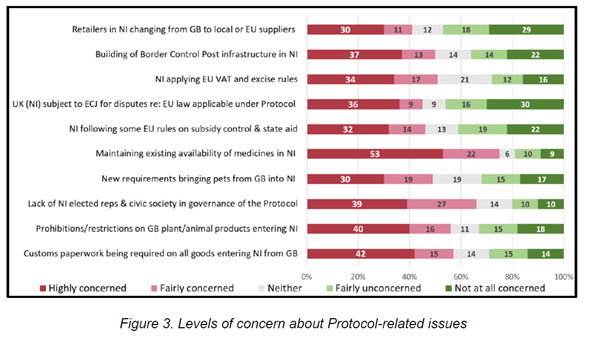
Beyond the medicines issue, two-thirds of respondents (66%) were concerned about the lack of involvement of elected representatives, officials and civil society from Northern Ireland in the governance of the Protocol. Clear majorities also expressed concern about customs paperwork (57%) being required for goods entering Northern Ireland from Great Britain and prohibitions or restrictions on plant and animal products crossing the Irish Sea (56%).
On most issues, more voters are concerned than unconcerned. Half of voters (50%) are concerned about the building of Border Control Post infrastructure at ports in Northern Ireland; just over a third (36%) are unconcerned.
However, on the question of whether the UK in respect of Northern Ireland should be subject to the jurisdiction of the Court of Justice of the EU for disputes regarding EU law applicable under the Protocol, respondents are evenly split: 45% concerned, 46% unconcerned. Only on the issue of retailers changing from suppliers in Great Britain to local and/or EU suppliers are more voters unconcerned (47%) than concerned (41%).
The importance of the Protocol compared to other issues
Aspects of the Protocol and its implementation clearly raise concern for many voters. However, the Protocol is not the issue that currently causes most concern to most voters. Presented with ten issues, most respondents indicated either the future of the National Health Service (NHS) (32%) or the constitutional future of Northern Ireland (26%) as most important to them. Only 9% selected the effects of the Protocol (see Figure 4).
However, considerably more voters (29%) ranked the effects of the Protocol as the issue of least concern to them. Based on the three issues of least importance to voters, only north-south cooperation (54%) is regarded as less important than the Protocol (44%).
Based on the three issues of most importance to voters, the Protocol is ranked fourth (32% respondents put it in the top three) behind the future of the NHS (67%), the state of the economy (52%) and the constitutional future of Northern Ireland (43%).
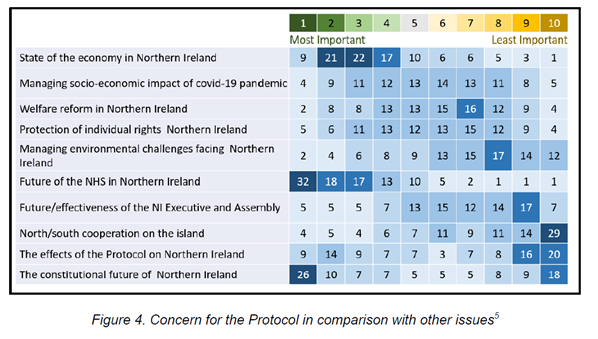
One third (32%) of respondents ranked the Protocol among the three issues of most concern to them. This is significantly less than the proportion (44%) which ranked the Protocol among the three issues of least concern to them.
Trust to manage the interests of Northern Ireland vis-à-vis the Protocol
The implementation of the Protocol involves a range of actors. As with all four previous polls, the only group that is trusted by a majority to manage the interests of Northern Ireland with respect to the Protocol are Northern Ireland’s business representatives (59%), and the level of trust has increased to its highest across the four polls to date (see Figure 5).
Trust in the UK government continues to be extremely low (4%) and as it was in October 2021. More than four fifths of respondents (84%) continue to distrust the UK government with a majority continuing to ‘distrust [it] a lot’ (51%), although this is lower than in the previous poll (57%).
By contrast, trust in and distrust of the European Commission/EU remains essentially unchanged from October at 45%, but this is a slight improvement on the June 2021 poll. The same is true with regard to the Irish government where the gap between levels of trust (42%) and distrust (46%) is unchanged from the October poll but up slightly from the June 2021 poll. It is notable that levels of trust in and distrust of both the Commission and the Irish government are broadly matched, with only a minority (c.10%) not holding an opinion on whether they can be trusted or not.
Trust in the NI Executive to manage the interests of Northern Ireland with respect to the Protocol remains strikingly low (16%) (with only the UK Government suffering lower levels of trust). The figure is only marginally better than in the October 2021 poll (13%) and matches the June poll (17%). A slight majority (52%) distrust the NI Executive (a figure essentially unchanged across our polls); this is broadly in line with levels of distrust of most other actors, with the exception of the UK Government (at 84%) and the DUP (at 72%).
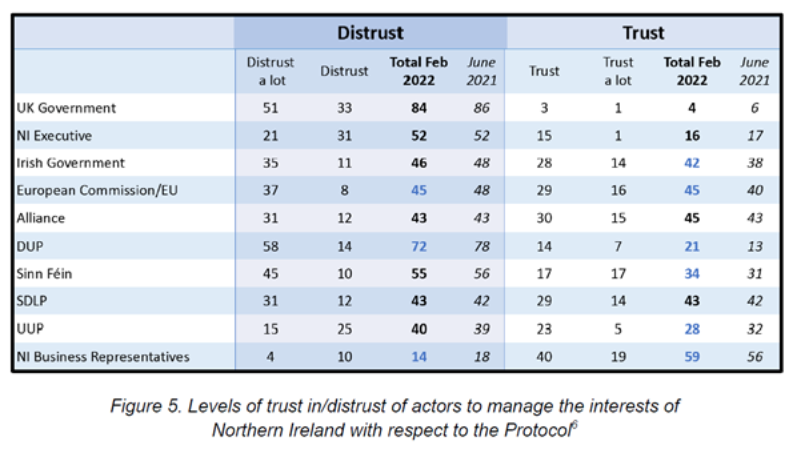
As for the levels of trust in/distrust of the five political parties that form the Northern Ireland Executive, those mostly remain unchanged. For Alliance (45%) and the Social Democratic and Labour Party (SDLP) (43%), the figures are up on the October 2021 poll (39% and 40% respectively) and back to the level of the June 2021 poll. Distrust of these two parties remains steady at similar levels to trust. As in October 2021, a third of respondents trust Sinn Féin (34%) and just over a quarter trust the Ulster Unionist Party (UUP) (28%) when it comes to the Protocol. But levels of distrust remain markedly higher for Sinn Féin (55%) than for the UUP (40%). As in the June and October 2021 polls, it is notable how many respondents – three out of ten – remain neutral towards the UUP. Distrust in the Democratic Unionist Party (DUP) (72%) continues to fall slightly on previous polls but remains very high. Trust in the DUP has improved most of all parties since the October and June polls, albeit only to 21% of voters.
Written comments on politics and political parties in Northern Ireland
Comments provided by respondents for this poll included some general and specific criticisms of politics in Northern Ireland. There was, however, significant criticism of the DUP, with 18% of optional written responses focusing on the party’s handling of Brexit and/or on its recent decision to withdraw from the Executive in protest against the Protocol:
"The Protocol is a necessary outworking of the hard Brexit that the DUP and others advocated for. I’m heartily sick of listening to their whining about it.”
“The DUP has now enacted its threat to bring down the Assembly over the Protocol. The Protocol is an integral part of Brexit which the DUP backed. It’s sad that they put self-interest over what’s best for the community.”
No comments specifically welcomed the First Minister’s resignation. However, there were a few which supported the suspension of the Assembly in protest at the Protocol. For example:
“Unionists MUST NOT GO BACK INTO Stormont until the Northern Ireland Protocol is Scrapped for GOOD. If the Northern Ireland Protocol Stays then there will be no Stormont and the GFA is dead.”
Democratic consent and MLAs
The future of core provisions of the Protocol – those relating primarily to the movement of goods (i.e. Articles 5-10) – is subject to the democratic consent of members of the Northern Ireland Assembly (MLAs) in a vote that is to be held up to every four years. MLAs will first vote in November/December 2024.
Most respondents (92%) have a view on how they wish their MLAs to vote: 50% in favour of the continued application of Articles 5-10 and 42% against (see Figure 6). These mirror the figures from October 2021 and so confirm the marked gap in views that has emerged since the June 2021 poll when voters were split almost evenly (46% in favour and 45% against). In the March 2021 poll, more respondents supported a vote in favour (47%) of the continued application of Articles 5-10 than a vote against (42%).
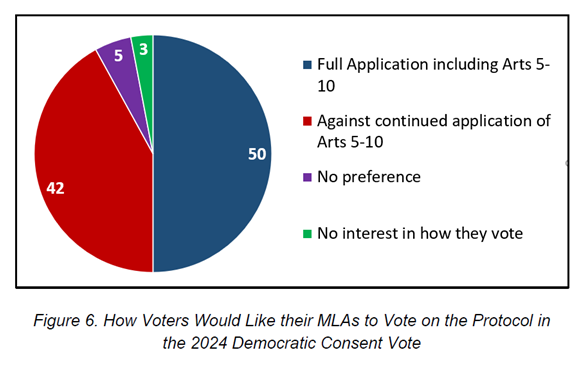
Most respondents say they will vote in the next NI Assembly election (due to occur on or before 5 May 2022) for candidates who share their view. In results in line with the October 2021 poll, 43% say they will only vote for candidates in favour of the continued application of Articles 5-10 of the Protocol; 37% say they will only vote for candidates opposed to its continued application. The gap has narrowed from ten percentage points in October 2021 to six, although it remains larger than the one and two percentage points in the March and June 2021 polls.
Of those who want their MLAs to oppose the Protocol, more than two thirds continue to want it removed in its entirety (although this is not possible under the terms of the democratic consent vote). One fifth of voters maintain that a candidate’s position on the Protocol will not determine whether they vote for them or not.
Understanding of the Protocol
In all three polls to date, at least 70% of respondents have indicated that they have a ‘good understanding’ of the Protocol. In this latest poll, the proportion (77%) was the highest yet. Such high self-reported levels of understanding are not, however, borne out in the responses to a series of ‘true or false’ statements included in one part of this poll, which tested knowledge of six important elements of the Protocol. Figure 7 shows the statements posed, and the percentage of respondents that described them as true and false. The circled percentages are those giving the correct answer. The red percentages are those in which most responses were incorrect.
Of the six statements, the correct response was provided by a majority of respondents in only three cases. And in none of these cases was the majority overwhelming. The two statements where majorities responded correctly were: the Protocol commits the UK to ensuring that the rights, safeguards and equality of opportunity set out in the 1998 Agreement are not diminished – true (57%); and Northern Ireland under the Protocol officially remains part of the UK customs territory and the UK internal market – true (55%).
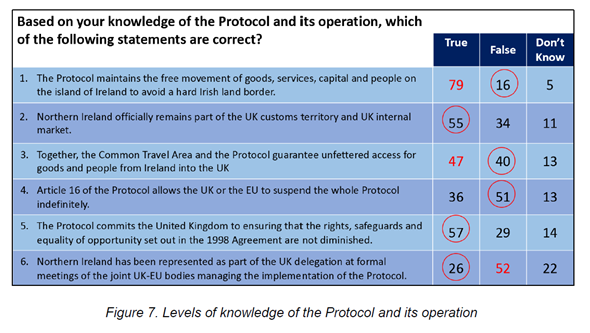
On whether Article 16 of the Protocol allows the UK or the EU to suspend the whole Protocol indefinitely, 51% of respondents correctly answered ‘false’. Any safeguard measures adopted under Article 16 are to be ‘restricted with regard to their scope and duration to what is strictly necessary in order to remedy the situation’. More than a third of respondents (36%) claimed the statement to be true, a reflection arguably of the quality of political debate in the UK about what triggering Article 16 can and cannot achieve.
Of the three statements to which a majority responded incorrectly, the most emphatic response was the claim by 79% of respondents that the Protocol maintains the free movement of goods, services, capital and people on the island of Ireland to avoid a hard Irish land border. The statement is false. The Protocol does provide for the free movement of goods on the island of Ireland, but not the other three ‘freedoms’. The partial exception relates to provisions relating to a single electricity market on the island of Ireland. Only 16% of respondents identified the statement as being false.
Only 26% of respondents noted correctly that Northern Ireland has been represented as part of the UK delegation at formal meetings of the joint UK-EU bodies managing the implementation of the Protocol. 52% of respondents claimed the statement to be false when in fact UK delegations to meetings of the Joint Committee, the Specialised Committee and the Joint Consultative Working Group have included ministers or officials from Northern Ireland in line with commitments contained in the New Decade, New Approach deal. The fact that this statement was one in which 1 in 5 people answered ‘Don’t Know’ shows quite how significant the lack of public awareness is when it comes to the governance of the Protocol. We would suggest that the blame for this does not lie with members of the public themselves.
Responses were less clear on whether, together, the Common Travel Area (CTA) and the Protocol guarantee unfettered access for goods and people from Ireland into the UK. The statement is false and was identified as such by 40% of respondents; 47% claimed it was true. Neither the CTA nor the Protocol contains such guarantees. The Protocol only covers goods from Northern Ireland, not Ireland as a whole; and the CTA only covers Irish and UK citizens, so not non-Irish EU citizens, for example.
Such a pattern of responses indicates an outstanding need for greater awareness and more accurate and honest presentations of what the Protocol does and does not cover.
Public opinion on what might come next
The final section of the poll involved a re-run of some previous questions, some new options regarding governance of the Protocol, and some questions on the significance of recent political developments for the Protocol.
As noted above, more than three-fifths of respondents (63%) continue to agree that the Protocol provides Northern Ireland with ‘a unique set of post-Brexit economic opportunities compared to the rest of the UK which if exploited could benefit Northern Ireland’. The figure confirms the upward trend through the previous polls in March (50%), June (57%) and October 2021 (62%).
On whether the UK government would be justified in triggering Article 16 now – a question first asked in the October 2021 poll – a majority of respondents (53%) still disagree. As in the October poll, 39% are of the view that the UK government would be justified in triggering Article 16.
In answer to a related question, 56% of respondents agreed that the UK government must prioritise in all circumstances upholding its international treaty obligations including under the Protocol; 34% disagreed.
When it comes to matters of governance of the Protocol and ‘voice’ from Northern Ireland, there are clear and consistent patterns. 78% of respondents (up from 73% in October) agree that formalised structures for the UK-EU bodies overseeing the Protocol to hear directly from business and civil society organisations in Northern Ireland should be put in place. Only 11% disagree.
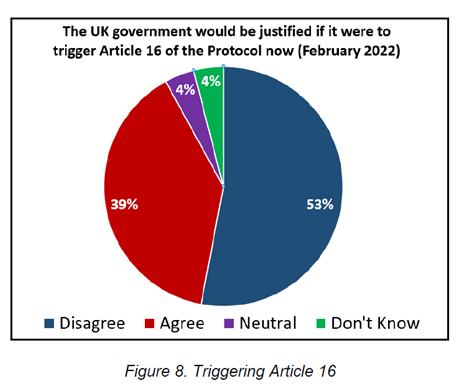
A majority of respondents (64%) also agrees that the recently established UK-EU Parliamentary Partnership Assembly should have a sub-committee dedicated to Northern Ireland and that this sub-committee should include MLAs. 15% disagree, with a further 21% being neutral or having no opinion.
We were able to include two questions that addressed the political developments that occurred immediately prior to the poll going live. Only 37% of respondents agree that Minister Poots is right to insist that officials cease border checks on agri-food products entering Northern Ireland from Great Britain; 59% disagree. And just a quarter (26%) of respondents think that the resignation of Paul Givan as First Minister will strengthen the hand of the UK government in its talks with the EU over the Protocol; 60% disagree.
A final question concerned whether the print and broadcast media in Northern Ireland can ‘generally be relied on to provide balanced coverage of political and economic developments concerning the Protocol’. Only 21% of respondents agree that they can provide such coverage; three times as many (63%) disagree.
This brings us to the conclusion that, although there are strong opinions and concerns about the Protocol, perhaps a more significant finding from the four polls conducted so far is the perceived lack of reliable information on the subject, the actual lack of awareness and/or knowledge that the public have (through no fault of their own), and the widespread lack of trust they have generally in the actors responsible for managing Northern Ireland’s interests with respect to the Protocol.
The full report can be downloaded here: Testing the Temperature 4
